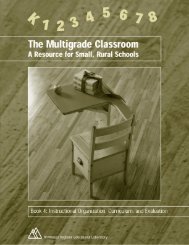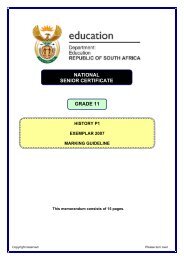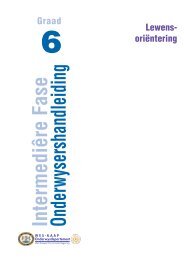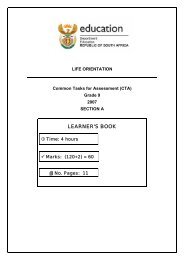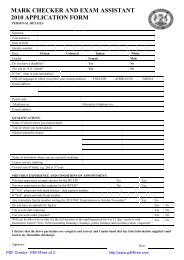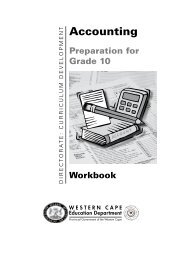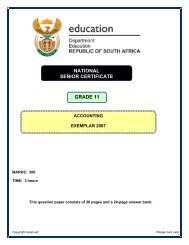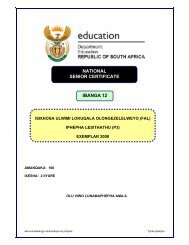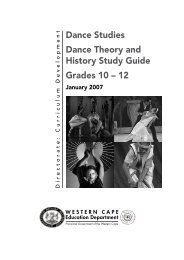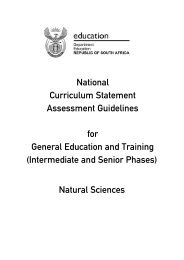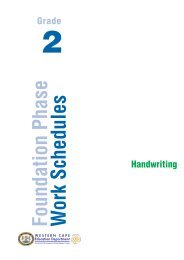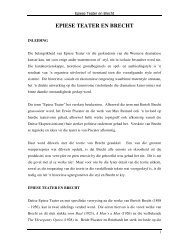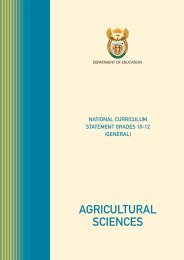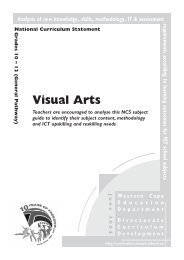Business Studies - Curriculum Development
Business Studies - Curriculum Development
Business Studies - Curriculum Development
You also want an ePaper? Increase the reach of your titles
YUMPU automatically turns print PDFs into web optimized ePapers that Google loves.
Rules of Combination for FETC:(See Qualifications and Assessment Policy Framework page 15-17)Fundamental Core ElectiveHome Language (20)(4,5 hours per week)Home Language /1st Add Language (20)(4,5 hours per week)Mathematics/Maths Literacy (20)(5 hours per week)Life Orientation (10)(2 hours per week)2 subjects from thesame Field(2 x 20)(2 x4,5 hours per week)1 subject from the sameor a different Field(1x 20)(1 x4,5 hours per week)70 credits 40 credits 20 creditsSUBJECT OVERVIEW(See NCS Grades 10-12 <strong>Business</strong> <strong>Studies</strong> pages 9-10)Definition(See NCS Grades 10-12 <strong>Business</strong> <strong>Studies</strong> pages 9-10)The subject <strong>Business</strong> <strong>Studies</strong> deals with the knowledge, skills, attitudes and values critical for informed,productive, ethical and responsible participation in the formal and informal economic sectors.The subjectencompasses business principles, theory and practice that underpin the development of entrepreneurialinitiatives, sustainable enterprises and economic growth.PurposeThe subject intends to build the capacity of learners towards being informed, imaginative, participative,contributing and reflective business practitioners who can dynamically perform a range of interdependentbusiness operations.The development of these business roles will put learners in a position where they are able to effectivelyapply knowledge and skills to analyse and deal with different business environments (macro, micro andmarket), to initiate and carry out business ventures and successfully carry out business operations.Theseroles and operations can also be applied within other organisational structures, such as public sector andnon-profit organisations.Scope<strong>Business</strong> <strong>Studies</strong> encompass relevant contemporary theory and competence essential for promotingexcellence and contributing towards sustainable business enterprises. It embraces constitutional goalsand objectives through promoting accessible, legitimate and entrepreneurial business opportunities.The subject also provides opportunities for learners to consider present-day challenges within theenabling South African policy framework. Skills such as decision-making, problem solving, creativethinking, systems thinking and effective communication in a competitive and constantly changingenvironment are critical to this subject.National <strong>Curriculum</strong> Statement 3 <strong>Business</strong> <strong>Studies</strong>Grades 10 – 12 (General)
This subject has the following core features<strong>Business</strong> EnvironmentThis feature focuses on the different elements of the macro, micro and market business environments, aswell as the complex and diverse nature of business sectors.<strong>Business</strong> VenturesThis feature focuses on the development of important factors that contribute towards the creation ofsustainable business enterprises.A key feature is the development of creative entrepreneurs who canidentify and responsibly pursue productive business opportunities.<strong>Business</strong> RolesThis feature covers the essential roles that learners need to perform in a variety of business contexts.<strong>Business</strong> OperationsThis feature should equip learners with the knowledge and skills to effectively manage essential businessoperations such as human resources, public relations, marketing and production.These need to bedeveloped within the context of relevant legislation and contemporary issues.Educational and Career LinksLINK TO GET: The general principles, concepts and skills developed in the GET band, particularlythose developed in the Economic and Management Sciences learning area, are further d3eveloped inmore complex contexts through the subject of <strong>Business</strong> <strong>Studies</strong> in the FET band.FET & HET: The Learning Outcomes of this subject articulate with those of the <strong>Business</strong>, Commerceand Management field and with other related fields at both FET and HET training levels.Achievement of the <strong>Business</strong> <strong>Studies</strong> Learning Outcomes equips learners with a sound foundation to -participate in future business, commerce and management studies.CAREERS: Achievement of the <strong>Business</strong> <strong>Studies</strong> Learning Outcomes equips learners with a soundfoundation to enter business or to create self-employmentLearning Outcomes(See NCS Grades 10-12 <strong>Business</strong> <strong>Studies</strong> pages 10-23)LO 1: <strong>Business</strong> EnvironmentsThe learner is able to demonstrate knowledge and analyse the impact of changing and challengingenvironments on business practice in all sectors.LO 2: <strong>Business</strong> VenturesThe learner is able to identify and research viable business opportunities and to explore these andrelated issues through the creation of achievable business ventures.LO 3: <strong>Business</strong> RolesThe learner is able to demonstrate and apply contemporary knowledge and skills to fulfil a variety ofbusiness roles.LO 4: <strong>Business</strong> OperationsThe learner is able to demonstrate and apply a range of management skills and specialised knowledge toperform business operations successfully.<strong>Business</strong> <strong>Studies</strong> 4 National <strong>Curriculum</strong> StatementGrades 10 – 12 (General)
Assessment StandardsAssessment standards are written per grade for each learning outcome, thus indicating conceptualprogression from grade to grade.They embody knowledge, skills and values required to achieve the LOs.In this sense they provide criteria of what the learners should know and demonstrate at a specific grade.Content and Context(See NCS Grades 10-12 <strong>Business</strong> <strong>Studies</strong> pages 24-31)In this section proposed content and contexts are provided to support the attainment of the assessmentstandards.The broad content areas are arranged progressively according to grades.The following are ‘new’ areas of content/skills:Major adaptations were possible, as Economic and Management Sciences is now taught from Grade R,therefore learners establish a greater command of the basic terminologies of the subject and haveapplicable knowledge, understanding, skills and attitudes than in the past.Taking this into account, a fairlylarge new content, with new teaching and learning strategies, informed by the critical outcomes, and keyNCS principles, were compiled:<strong>Business</strong> Environments (LO1) is a new focus.This Learning Outcome deals with the elements of thebusiness environments (macro, micro, market) that impact on business activities. <strong>Business</strong> can controlthese environments to varying degrees.All business practitioners need to be aware of theseenvironments and the degree to which they can be influenced. Primary, secondary and tertiary sectorsare also covered within this Learning Outcome.Contemporary factors such as globalisation, relevant legislation, socio-economic issues, infectious diseases(e.g. HIV/Aids) and the challenges that these provide for business enterprises will be analysed.<strong>Business</strong> Ventures (LO2) is also a new focus.This Learning Outcome focuses on the generatin ofideas, research, drawing up and presentation of business plans and business information, and thedevelopment and implementation of achievable action plans.Learners analyse issues related to initiating a business, such as entrepreneurship, forms of ownership,location factors, legal considerations (e.g. contracts), and social and environmental issues.<strong>Business</strong> roles (LO3) is another new focus. The primary focus of this Learning Outcome is onpreparing learners to apply self-management skills and to be professional business practitioners,collaborators, team members, innovators, entrepreneurs and citizens.Critical issues such as community development, diversity, team dynamics, leadership, professionalism,ethical practice, personal growth, as well as managing and adapting to change and transformation areincluded.ICT linksInformation and Communication Technologies supporting the National <strong>Curriculum</strong>Statement through e-LearningThe national Department of Education has indicated that ICT will support the introduction of the NCSby distributing official documentation, delivering OBE orientation for educators, introducing new subjectcontent to teachers, assisting in the development of learning programmes, delivering exemplar materialfor NCS subjects, giving access to learning and teaching support materials, and providing opportunitiesfor educators to communicate and share experiences and expertise.The national education portal,Thutong, is dedicated to electronic teaching and learning support: http://www.thutong.org/)The Western CapeIn the Western Cape, the provincial education portal (WCED Online) is at http://wced.wcape.gov.za/ Thiscontains a great deal of information about the WCED and its services to schools.The <strong>Curriculum</strong>website can be accessed from WCED Online, or directly at http://curriculum.wcape.school.za/ Schools inthe Khanya Project will have visited http://www.khanya.co.za/ All these websites and others provideinformation and resources for schools, and will be extended in due course.National <strong>Curriculum</strong> Statement 5 <strong>Business</strong> <strong>Studies</strong>Grades 10 – 12 (General)
Computers in schoolsMany high schools in the Western Cape already have computers for the use of their teachers andlearners. Those without computers will be assisted to acquire them over the next few years.Access tocomputers means that teachers and learners can obtain access to world class resources. Learners areable to do research, calculate, write, save and organise their assignments logically. School ManagementTeams will be responsible for planning and organizing school timetables so that teachers, classes andlearners have equitable access to available ICT resources. Teachers will be provided with opportunitiesto acquire the skills necessary for integrating ICT into their planning and teaching.ICT and the FET SubjectsThe NCS documents clearly specify the use of computers for some of the FET subjects, and advocatetheir use in many others. Each school will take this into account when planning the learning fields andsubjects it offers. In planning their lessons, teachers will select the medium for each specific learningactivity which will best achieve the learning outcomes required. In this way teachers and learners willengage with a variety of media.The culminating benefit to learners who learn through the use of computers will be the development ofa mindset for the twenty-first century. E-Learning encourages them to become citizens with the logic,creative thinking and problem solving skills to contribute meaningfully to South African and globalsociety..REFERENCES1. FET Legislation: Government Gazette 25545, Notice 1407 of 6 October 20032. WebSoftware & Web-sites:WCED Economics web-site: http://curriculum.wcape.school.za/site/28Educator support, e.g. lesson planning: www.bized.ac.ukDepartment of Trade and Industry: www.dti.gov.zaFinancial Mail: www.financialmail.co.zaFinansies en Tegniek: www.fmt.co.za3. Other resources:Textbooks and Reference books and Subject journals: Many titlesavailable from EDULIS for new content, Current textbooks used in schools for contentthat remained unchanged.EDULIS: 15 Kruskal Avenue, Bellville.Tel 021-957 9600DataBase may be searched at http://edupals.wcape.gov.zaSUGGESTED EDUCATOR RESOURCES:• De Coning et al. 1989. Succeed in your own <strong>Business</strong>.Acacia Books. Pretoria.• Le Roux, et al. 1995. <strong>Business</strong> Management – a practical approach. Lauren. Pretoria.• De I Cronje, GI et al. 1997. Introduction to <strong>Business</strong> Management 4th Edition.Thomson– Publishing. Johannesburg.• University of Stellenbosch <strong>Business</strong> School. 1995. Entrepreneurship – Your gateway to personalIndependence.Africa Growth Network. Johannesburg• Du Plessis PG (Ed). 1993.Approved <strong>Business</strong> Economics.An Introductory Survey. EducationalPublishers. Pretoria.• Smit L & Vand Bijl,A. 2002. <strong>Business</strong> Management Workbook. CLS Publishers. Cape Town.Economic Dictionaries• Bannock, Baxter & Davis. 1998.The Penguin Dictionary of Economics. 6th Edition. Penquin.London.<strong>Business</strong> <strong>Studies</strong> 6 National <strong>Curriculum</strong> StatementGrades 10 – 12 (General)



